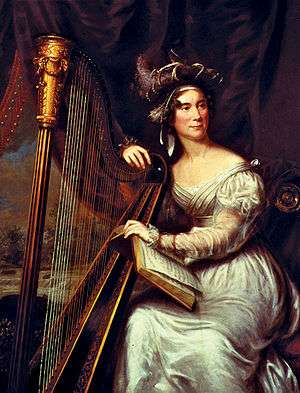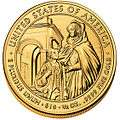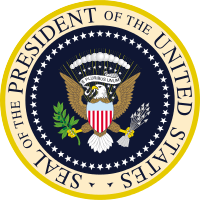Louisa Adams
| Louisa Adams | |
|---|---|
 | |
| First Lady of the United States | |
|
In office March 4, 1825 – March 4, 1829 | |
| President | John Quincy Adams |
| Preceded by | Elizabeth Monroe |
| Succeeded by | Emily Donelson (Acting) |
| Personal details | |
| Born |
February 12, 1775 London, Great Britain |
| Died |
May 15, 1852 (aged 77) Washington, D.C., U.S. |
| Spouse(s) | John Quincy Adams (1797–1848) |
| Children |
George John Charles Louisa |
| Religion | Unitarianism |
| Signature |
|
Louisa Catherine Johnson Adams (née Johnson; February 12, 1775 – May 15, 1852), wife of John Quincy Adams, was First Lady of the United States from 1825 to 1829. She is the only First Lady born outside of the United States.
Early life
Born Louisa Catherine Johnson on February 12, 1775, in London, she was the daughter of Catherine Nuth Johnson, an Englishwoman and Joshua Johnson, an American merchant whose brother Thomas Johnson later served as Governor of Maryland and United States Supreme Court Justice. Joshua Johnson was originally from Maryland. She had six sisters: Ann, Caroline, Harriet, Catherine, Elizabeth, and Adelaide, and a brother, Thomas. She grew up in London and Nantes, France, where the family took refuge during the American Revolution.
Marriage and children
She met John Quincy Adams at her father's house in Cooper's Row, near Tower Hill, London. Her father had been appointed as United States consul general in 1790, and Adams first visited him in November 1795. Adams at first showed interest in her older sister but soon settled on Louisa. Adams, aged 30, married Louisa, aged 22, on July 26, 1797, at the parish church of All Hallows-by-the-Tower, Barking in Barking. Adams's father, John Adams, then President of the United States, overcame his initial objections to his son marrying a person born in another country and eventually welcomed his daughter-in-law into the family, although they did not meet for several years.[1]
Her parents left Europe in 1797 and went to the U.S. When her father was forced into bankruptcy, President John Adams appointed him as U.S. Director of Stamps. Her father died in Frederick, Maryland, in 1802 of severe fever and some mental problems, leaving little provision for his family. Her mother died in September 1811, in her mid-fifties[2] and is buried in Rock Creek Cemetery.
John Quincy Adams and Louisa Adams had the following children:
- George Washington Adams (1801–1829), lawyer
- John Adams II (1803–1834), presidential aide
- Charles Francis Adams (1807–1886), diplomat, public official, and author
- Louisa Catherine Adams (August 12, 1811 – September 15, 1812), born and died in St Petersburg, Russia, buried in the Lutheran Cemetery there.[3]
Married life

Louisa was sickly, plagued by migraine headaches and frequent fainting spells. She had several miscarriages over the course of her marriage.
She left her two older sons in Massachusetts for education in 1809 when she took two-year-old Charles Francis Adams to Russia, where Adams served as a Minister. Despite the glamour of the tsar's court, she had to struggle with cold winters, strange customs, limited funds, and poor health. An infant daughter born in 1811 died the next year.
Peace negotiations called Adams to Ghent in 1814 and then to London. To join him, she made a forty-day journey across war-ravaged Europe by coach in winter. Roving bands of stragglers and highwaymen filled her with "unspeakable terrors" for her son. The next two years gave her an interlude of family life in the country of her birth.
When John Quincy Adams was appointed James Monroe's Secretary of State in 1817, the family moved to Washington, D.C. where Louisa's drawing room became a center for the diplomatic corps and other notables. Music enhanced her Tuesday evenings at home, and theater parties contributed to her reputation as an outstanding hostess.
The pleasures of moving into the White House in 1825 were dimmed by the bitter politics of the election, paired with her deep depression. Though she continued her weekly "drawing rooms", she preferred quiet evenings of reading, composing music and verse, and playing her harp. As First Lady, she became reclusive and depressed. For a time, she regretted ever having married into the Adams family, the men of which she found cold and insensitive. The necessary entertainments were always elegant and her cordial hospitality made the last official reception a gracious occasion although her husband had lost his bid for re-election and partisan feeling still ran high.
In his diary for June 23, 1828, her husband recorded her "winding silk from several hundred silkworms that she has been rearing," evidently in the White House.[4]
She thought she was retiring to Massachusetts permanently, but in 1831 her husband began seventeen years of service in the United States House of Representatives. The untimely deaths of her two oldest sons added to her burdens.
"Our union has not been without its trials," John Quincy Adams conceded. He acknowledged many "differences of sentiment, of tastes, and of opinions in regard to domestic economy, and to the education of children between us." But added that "she always has been a faithful and affectionate wife, and a careful, tender, indulgent, and watchful mother to our children."
Her husband died at the United States Capitol in 1848. She remained in Washington until her death of a heart attack on May 15, 1852, at the age of 77. She is entombed at his side, along with President John Adams and first lady Abigail Adams, in the United First Parish Church in Quincy, Massachusetts.
First Spouse Coin
 | |
|
|
The First Spouse Program under the Presidential $1 Coin Act authorizes the United States Mint to issue 1/2 ounce $10 gold coins and medal duplicates[6] to honor the first spouses of the United States. Louisa Adams' coin was released May 29, 2008.
-

Obverse
-

Reverse
-

Obverse (bronze medal)
-

Reverse (bronze medal)
Writings
- The Diary and Autobiographical Writings of Louisa Catherine Adams: 1778 -1850, 2 vols., The Adams Papers (Harvard University Press: 2013)
- Margaret A. Hogan and C. James Taylor, editors, A Traveled First Lady: Writings of Louisa Catherine Adams (Cambridge: Belknap Press, 2014)
References
- ↑ Lewis L. Gould, American First Ladies: Their Lives and Their Legacy (2014), pp. 45-48
- ↑ O'Brien, Mrs. Adams in Winter, 249
- ↑ O'Brien, Mrs. Adams in Winter, 248–52
- ↑ Diary (New York: Longmans, Green, 1929) p. 380
- ↑ "First Lady Louisa Adams". C‑SPAN. March 18, 2013. Retrieved March 25, 2013.
- ↑ U.S. Mint: First Spouse Program. Accessed June 27, 2008. "The United States Mint also produces and make available to the public bronze medal duplicates of the First Spouse Gold Coins."
Further reading
- Cook, Jane Hampton., American Phoenix: John Quincy and Louisa Adams, the War of 1812, and the Exile that Saved American Independence (Thomas Nelson: 2013)
- Nagel, Paul. The Adams Women: Abigail and Louisa Adams, Their Sisters and Daughters (Cambridge: Harvard University Press, 1987)
- Heffron, Margery M. Louisa Catherine: The Other Mrs. Adams (Yale University Press, 2014) x, 416 pp.
- O'Brien, Michael. Mrs. Adams in Winter: A Journey in the Last Days of Napoleon (NY: Farrar, Straus and Giroux, 2010)
- Schneider, Dorothy, and Carl J. Schneider, First Ladies: A Biographical Dictionary (Facts on File: 2010), "Louis Catherine Johnson Adams", 42-52
External links
| Wikimedia Commons has media related to Louisa Adams. |
| Honorary titles | ||
|---|---|---|
| Preceded by Elizabeth Monroe |
First Lady of the United States 1825–1829 |
Succeeded by Emily Donelson Acting |
| ||||||||||||||||||||||||||||||||||||||||||||||
|
